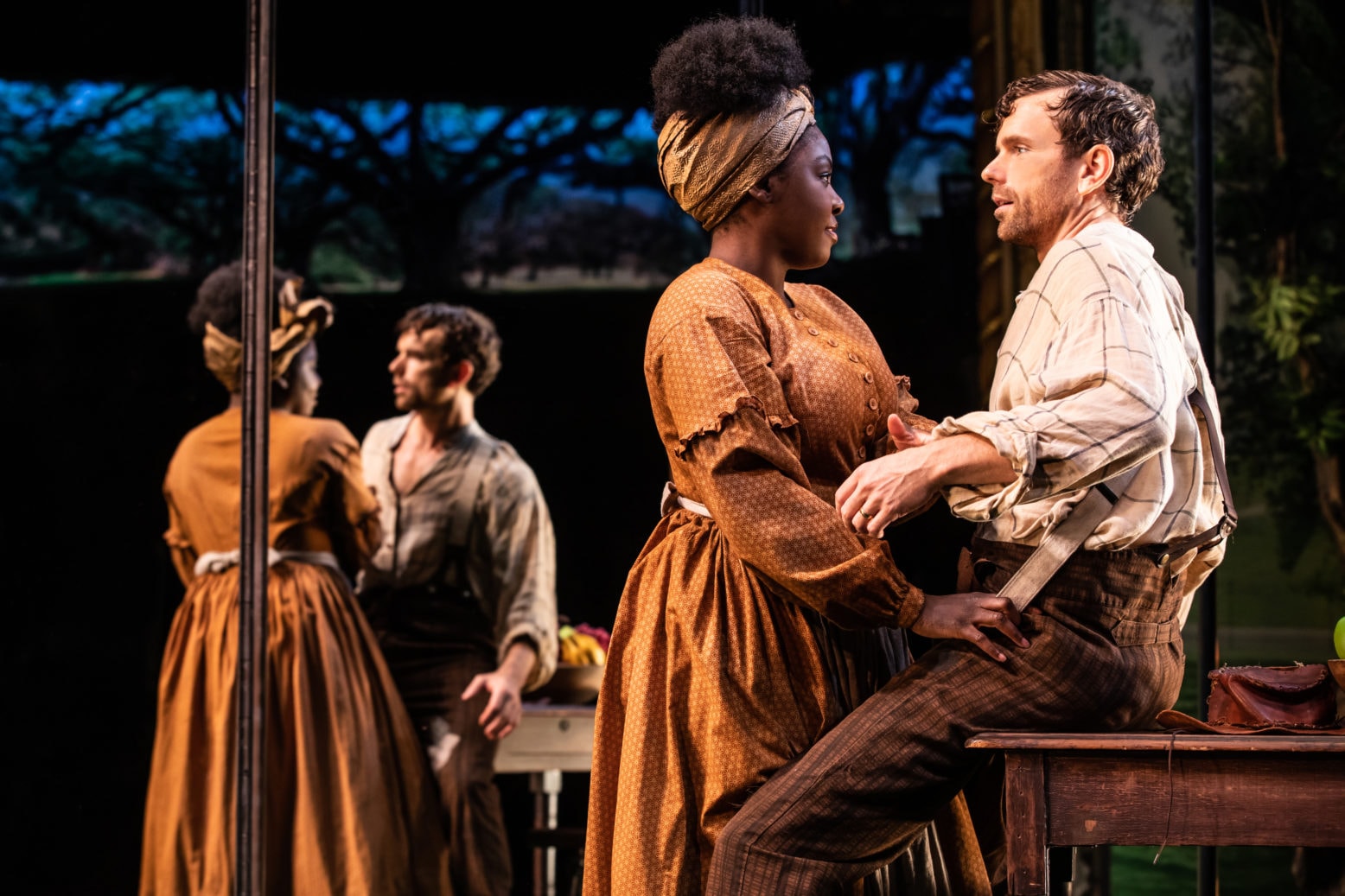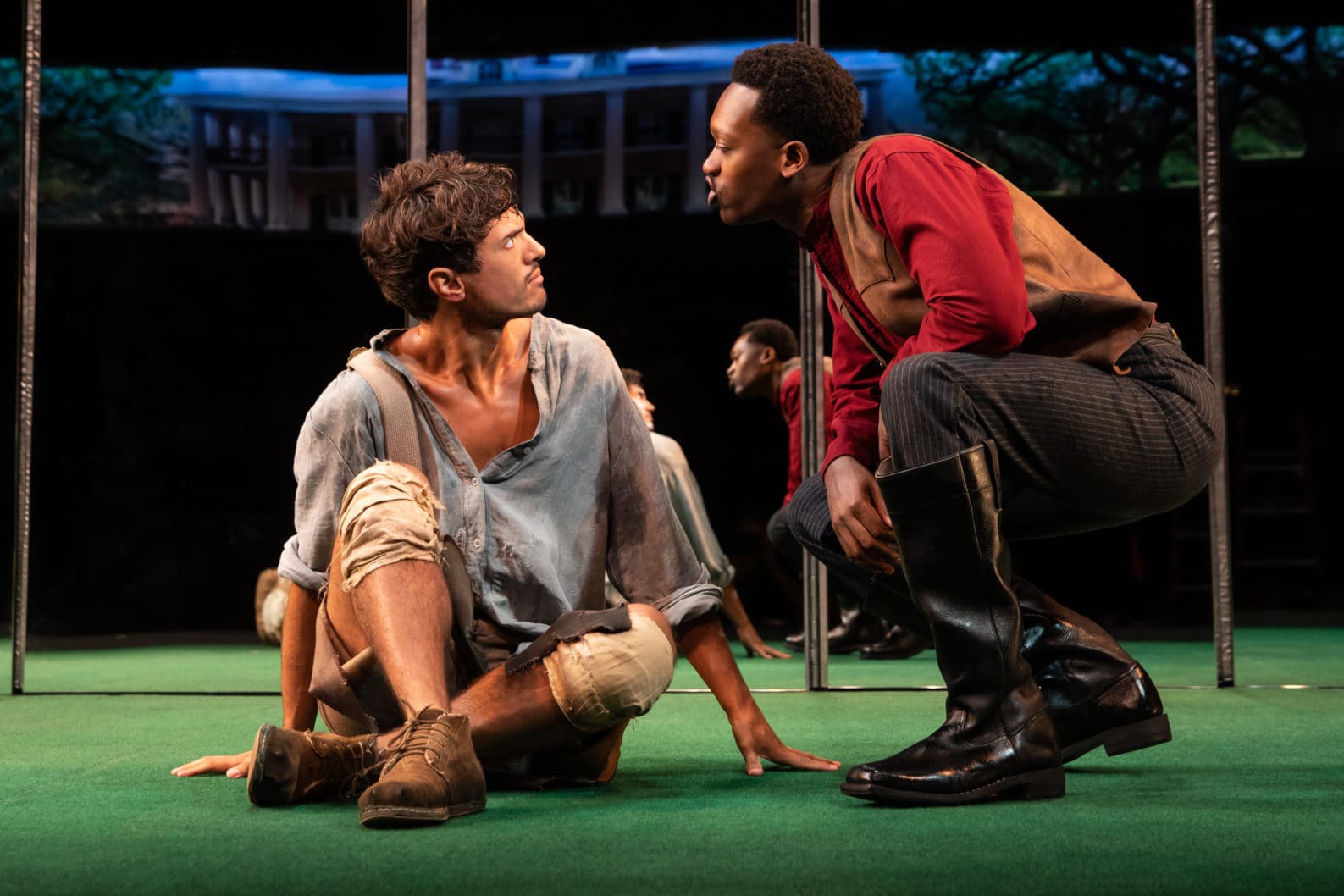An antebellum plantation is a hotbed of erotica in the raw, ribald and at times ridiculously funny examination of race in Jeremy O. Harris’s Slave Play. Three interracial couples run wild, in body and soul, through the dark corners of the MacGregor Big House as they explore the morbidly entangled roots of white supremacy, racial identity, and the primal urge of sexual desire.

Might as well go back to the root of the problem -slavery- and its persistently omnipresent effects on the psychic landscape of America. But if you think you had nothing to do with slavery because you weren’t around, Slave Play turns a mirror on you in a way that you cannot escape, forcing you to experience the lingering traumatic effects imposed by the construct of race in America’s DNA.
The audience sees its reflection from the stage through Clint Ramos’s clever scenic design. A big, white plantation house and leafy foliage by way of floor to ceiling mirrors fill the backdrop of the stage. You can’t escape seeing yourself as you look at the stage and the performers and are consequently immediately and intimately part of the action, the characters and the problem- whether you want to be or not, by design.
Playwright Jeremy O. Harris wrote Slave Play while still a grad student at Yale and pulled in Robert O’ Hara, his mentor and teacher, to direct it when it debuted off-Broadway at the New York Theatre Workshop in 2018. The provocative play has been phenomenally well-received as a NYT Critics Pick, Winner of the 2018 Kennedy Center Rosa Parks Playwriting Award, the Lorraine Hansberry Playwriting Award and The Lotos Foundation Prize in the Arts and Sciences. And now it’s on to Broadway at the Golden Theatre.
In opening scenes on the plantation, Kaneisha (Joaquina Kalukango) is a twerking house slave with a big butt who becomes overcome with a strong current of orgasmic energy in the presence of Jim (Paul Alexander Nolan), an oversexualized White overseer who whips it before devouring it.
Alana (Annie McNamara) is the big-skirted lady of the Big House who rips off her corset in her fetish for the tall, dark and handsome Philip (Sullivan Jones), a fiddle-playing mulatto house servant who plays upon the madam’s body to suit her sadomasochistic fancies.
Gary (Ato Blankson-Wood) turns the tables in a power play as overseer and the Black half of a gay couple while Dustin (James Cusati-Moyer) willingly licks Gary’s big black boots as he loads bales of cotton at Gary’s feet.
It all comes to a head; pardon the pun, when the couples inevitably encounter deep psychological turmoil within the interplay of race and power through sexuality.

Deciding where the balance of power lies is inherent in every relationship. It’s universal. But when race is at the center of the dynamics, the fallout from white supremacy creates a layer of traumatic complication that can only be resolved by direct confrontation.
The maladaptive responses to the “virus” of whiteness interwoven with the pain and abuse from being Black in America cannot be solved by the process of intellectual analysis, although Slave Play, not to give away the story-line, unexpectedly moves it in that direction.
Trying to apply a salve made for the head when the wound is in the heart is an inevitable set-up that leads to frustration and exhaustion. Slave Play is a blow-by-blow expression of the battle fatigue of dealing with race.
Long sections of the play are thus exhausting with excessive dialogue that you wish would end, particularly group conversations facilitated by the characters of Teà (Chalia La Tour) and Patricia (Irene Sofia Lucio).
Perhaps this wringing of the nerves with overbearing talk about the psychological suffering inherent in dealing with racism is enough to end its power over us– a trick the playwright devised on purpose.
It is soon obvious that everyone suffers – the victims as well as the perpetrators of white supremacy. And the playwright doesn’t let you off the hook. Rather, he wears you down with Slave Play’s stinging message.
The fine ensemble of actors works exceptionally well together and it’s interesting to note that half of the cast are graduates of the Yale School of Drama, same as the playwright. It’s a powerful homecoming and family affair in that sense.
Slave Play dives into racial confrontation as it (to quote one of the characters) “processes the psychic space” of race relations. It is brilliant but also shocking, bold and coarse. Its palatability will leave some wanting more and others, perhaps, gagging. But doesn’t that make for great theater? You are not given all of the answers but the questions beg for a response that you will leave the theater pondering.
Running Time: Two hours and 10 minutes with no intermission
Slave Play plays through Sunday, January 19, 2020, at the Golden Theatre – 252 West 45th Street, NYC. For tickets, call (212) 947-8844, or purchase them online.




